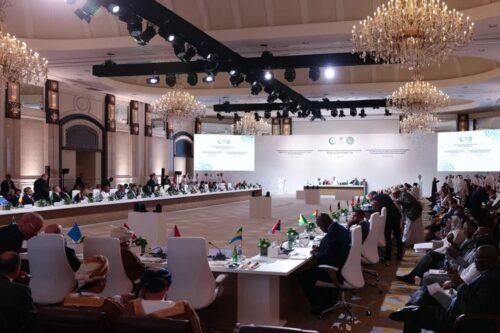
The National Interest Foundation Newsletter
Issue 302, September 19, 2025
Welcome to our NIF Newsletter. In this week’s edition, we look into Arab and Muslim leaders’ meeting in Doha to discuss Israel’s attack on Qatar, while also examining the justifiable backlash that prompted the removal of a provision in a proposed bill.
Editor: Bassam Tarbush
Arab and Muslim Leaders Meet in Doha to Discuss Israel’s Attack on Qatar

Qatar hosted an emergency summit earlier this week in response to last Tuesday’s reprehensible Israeli attack on Doha which sought to assassinate Gaza ceasefire negotiators. The gathering of Arab and Muslim leaders from nearly 60 nations saw the group express their solidarity with Qatar and uniformly denounce the attack as a flagrant violation of the country’s sovereignty and yet another undeniable attempt to derail ceasefire talks regarding Gaza. Those assembled also called on the Trump administration to use its leverage to rein in Israel’s continuous reckless and unlawful actions, remarking that doing so is long overdue. Concerns surrounding the lack of measures to restrain Israel’s increasingly bellicose and dangerous behavior have been further fueled by suggestions that President Trump was informed of the plans to attack Qatar beforehand. Ultimately, with or without the Trump administration’s prior knowledge and consent, the Israeli attack on Qatar has augmented the already existing recognition that the Netanyahu government is a major destabilizing force in the region.
Experts have drawn attention to how the Israeli attack on Qatar is also a significant development given that it has understandably shaken the trust and confidence of U.S. allies in the Gulf regarding the United States’ ability to protect them from harmful aggression. Qatar was designated as a Major Non-NATO Ally (MNNA) by the United States back in 2022, and thus the attack last week has led to questions about the protection that the MNNA status should provide and why this was not the case. The country hosts the Al Udeid Air Base – the largest American military installation in the Middle East – and several months ago, American air defense systems were activated to counter an Iranian missile attack against Qatar, but yet, this did not transpire last week. All of this has fairly fueled speculation as to whether the Trump administration may have deliberately failed to thwart the Israeli attack and erodes the perception of the United States as a reliable security guarantor in the region – something particularly troubling due to Qatar’s MNNA status, role as a key mediating and diplomatic force in the Middle East, and being home to the Al Udeid Air Base. The incident has elicited uncertainty over the United States’ ability or even willingness to keep Israel’s belligerent actions in check and undermines the credibility of the U.S. as a security guarantor. Ultimately, the Israeli attack and absence of U.S. protection will likely prompt Gulf states like Qatar to re-evaluate their security arrangements.
On this note, the summit of leaders in Qatar included a pledge by the Gulf Cooperation Council (GCC) to activate a joint defense mechanism and boost Gulf deterrent capabilities. As such, the GCC countries have called for future meetings of the Joint Defense Council and the Unified Military Command in Doha to assess member states’ defense posture and determine the next executive steps to be taken. This marks only the third time that a push to activate joint defense mechanisms has been initiated, with the previous instances coming during the 1991 Gulf War and the 2011 Arab Spring. Officials at the Doha summit also took time to condemn and warn against Israel’s multitude of destabilizing actions in the Middle East, including through its repeated bombings of nearby countries such as Lebanon, Syria, and Yemen, on top of its longstanding destructive war in Gaza and recent attack against Qatar. Israel’s violations have consisted of illegal land seizures in the occupied West Bank and Syria as well. Some in attendance at the Doha summit urged for economic pressure and accountability through international legal channels as needed ramifications to properly address the various aforementioned Israeli transgressions.
While the gathering was being held in Doha, U.S. Secretary of State Marco Rubio traveled to Israel to meet Netanyahu. Despite global denunciation of Israel’s attack on Qatar, Rubio seemed to skirt and downplay the issue – even as Netanyahu refused to rule out potential future ones like it. Analysts have understandably pointed out that Trump administration officials are failing to hold the Netanyahu government accountable for its harmful expansion of the war in Gaza which has coincided with growing violations in the occupied West Bank as well. All of this is especially problematic considering its unlawful actions on the global stage too, which combined altogether should elicit a heightened sense of urgency to enact concrete punitive measures. Yet, there are no indications that this is likely to transpire, even in the face of universal outrage over last week’s attack on Qatar, an ever-increasing number of Israeli violations, and a calamitous expansion of the military assault on Gaza.
The Israeli military has intensified its bombardment and ground offensive in Gaza City, with rights groups rebuking the expanded assault for its certainty to exacerbate the humanitarian catastrophe across Gaza. Israeli forces have pushed forward with this in defiance of criticism from rights groups and aid organizations, widespread global condemnation of the escalation including from major actors on the world stage such as the United Kingdom, France, Germany, and the European Union, and as family members of hostages also vehemently oppose the Netanyahu government’s actions. In the preceding days, a coalition of aid organizations has urged the international community to take stronger and more decisive measures to stop the military offensive. This comes as yet another entity – this time an independent United Nations commission – concludes that Israel is committing genocide in Gaza, joining a long list of groups that have previously already reached that determination.
Justifiable Backlash Prompts the Removal of a Provision in a Proposed Bill

Widespread public outcry from civil liberties groups and free speech advocates prompted the withdrawal of a controversial provision in a proposed bill which would have granted U.S. Secretary of State Marco Rubio unilateral power to arbitrarily revoke passports. House Foreign Affairs Committee Chairman Brian Mast (R-FL) sparked the justifiable backlash after he introduced the provision as part of a larger State Department reorganization bill last week. Following the wave of condemnation, Mast later filed an amendment to remove the measure in what many hailed as a victory for the defense of freedom of speech and expression. Civil liberties organizations had warned that the provision would give Rubio broad powers that he could weaponize to target activists without due process and suppress constitutionally protected free speech. This fear has particular merit given that the State Department under the current Trump administration has already targeted individuals based solely on free speech and without cause or specific charges, especially those that have expressed views critical of Israeli policies and conduct.
Due to the similar type of vague language in the removed provision that resembled previous Trump administration attempts to stifle anti-Gaza War free speech, observers believe it was clearly intended to target activists seeking to draw attention to Israeli human rights violations and abuses. In his time serving as U.S. Secretary of State, Rubio has overseen efforts to try to deport international students merely involved in anti-war demonstrations on college campuses (most notably in the cases of Mahmoud Khalil and Rumeysa Ozturk) and deploy an AI-powered “Catch and Revoke” system to target foreign nationals Trump administration officials baselessly allege support Hamas. The now withdrawn Mast provision would have significantly escalated these unconstitutional and politicized measures by targeting U.S. citizens. Additionally, as one commentator put it, the provision would have alarmingly eliminated the right to due process and essentially allowed Rubio to be “judge, jury, and executioner” on the unilateral and arbitrary revocation of passports. The lack of due process that this would have created is highly troubling. Unlike cases where passport revocation normally follows some type of criminal conviction, the provision would have bypassed the legal process and given the executive branch unchecked power to make sole determinations at its whim. Analysts have also pointed to how the rhetoric in Mast’s provision mirrored that in the so-called “nonprofit killer” provision that some Republicans attempted to pass back in July. In that instance, the denounced provision was ultimately removed as well, but had it remained, it would have problematically allowed the Treasury Secretary to unilaterally strip nonprofit status from anything he alone deemed to be a “terrorist-supporting organization.”
In their sweeping denunciation of the removed provision, rights advocates highlighted some of the other major concerns with what it would have paved the way for. One official with the Foundation for Individual Rights and Expression (FIRE) outlined how unlike in a criminal court case where allegations of “material support for terrorism” would require prosecutors to demonstrate a direct connection between the defendant and a specific group, under the provision originally pushed by Mast, Rubio would not have the same evidentiary standards. Thus, the Secretary of State could have tried to label any form of protected free speech that he or the Trump administration did not like as “material support for terrorism” and grounds for passport revocation – without the need for an actual criminal charge or conviction. Furthermore, another huge issue with the removed provision is that individuals who were to have their passports revoked under it would only be able to appeal the decision to the State Department itself. This total lack of oversight would have been an undeniable abuse of power, giving one entity alone complete control over the process.
Civil liberties organizations rightly celebrated Mast’s backtracking and removal of the controversial proposed bill provision. The American Civil Liberties Union (ACLU) welcomed the scrapping of the provision, with ACLU officials remarking that “its a really great thing that this provision got struck…It was hugely problematic and created a huge risk of abuse and of politicized enforcement.” The Council on American-Islamic Relations (CAIR) also hailed the withdrawal, expressing that Mast’s retreat from the harmful measure shows that dangerous attacks on Americans’ rights can be stopped through organized advocacy and public pressure. While it is a significant victory for those on the front lines of safeguarding freedoms and civil liberties, others did take time to remind these groups and those who support their efforts that the original inclusion of the provision is proof of the lengths that some will go to try and silence dissent and as such, there is a need to remain vigilant in order to successfully push back against them.
